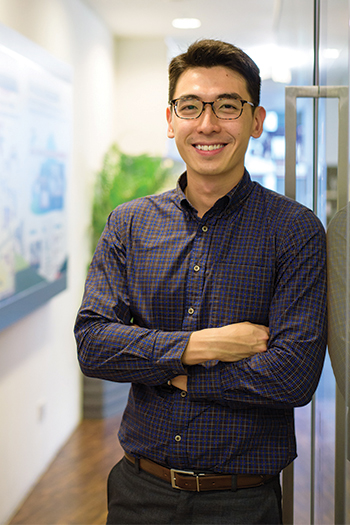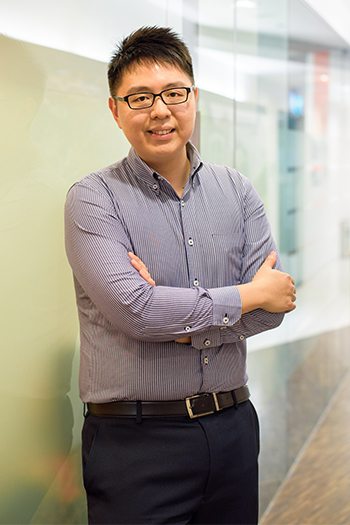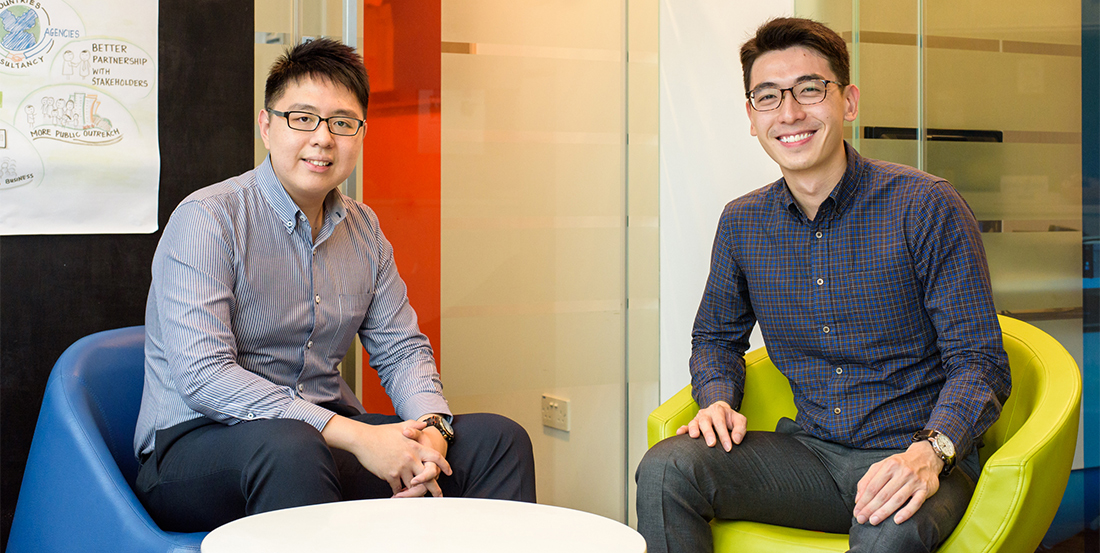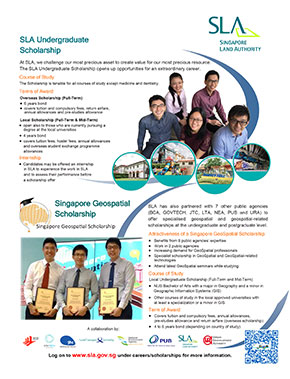The jigsaw of land resources, population growth and the changing needs of society make Singapore’s use of space a tricky puzzle to tackle. However, when all the pieces fit perfectly, the big picture comes into view and the final result benefits many for generations to come.
Taking constant challenges head-on, SLA is on a ceaseless mission to strike gold with innovative solutions for maximising the use of limited land. It’s a rewarding journey, and the first step begins here. Starting out as SLA Undergraduate Scholars, Tan Kian Meng and Eric Koh have since expanded their roles to play a bigger part in the development of Singapore. Kian Meng is now a Senior Executive in the Land Administration and Management unit at the Ministry of Law, and Eric wears two hats as Assistant Manager of the GeoSpatial Planning & Policy unit as well as Data Services Team member in the Geospatial & Data Division of SLA. They share with us how the SLA scholarship has benefitted them and what scholar hopefuls should take note of before making the crucial choice.
Why did you choose to take up a scholarship with SLA?
Tan Kian Meng: I always had a keen interest to join the real estate industry. Having spoken to some of the officers at SLA on the work and policies that SLA oversees, I became even more intrigued by the impact that SLA’s work has on the nation, especially on the optimisation of land resource for economic and social development.
Eric Koh: SLA is the leading agency on geospatial matters. Besides the use of GIST [Geographic Information Systems and Technology] in various core functions within SLA, SLA is spearheading the development of the GIST landscape in Singapore. Since I had my mind set on pursuing my interest in GIST, the decision to apply for the SLA scholarship was a definitive one.

Tan Kian Meng
SLA Local (Full Term) Undergraduate Scholar
Senior Executive
Land Administration and Management, Ministry of Law
Tell us about the scholarship benefits you received.
Kian Meng: The financial allowance helped to defray some of my living expenses, and allowed me to focus on my interests in mathematics and economics. SLA also offered me an internship during one of the semester breaks, which allowed me to understand the work done by SLA.
Eric: SLA allowed me to undertake an industrial attachment to further skills and knowledge that I had learnt through my Master’s programme. I was with the Open Data Institute in London as a research fellow to undertake research on smart cities and the use of geospatial and open data.
What is your role in your current position?
Kian Meng: My current portfolio deals with the optimisation of the State land and properties under SLA’s portfolio. This includes the letting out of State land and properties for short-term uses, maintenance of State land and properties, and enforcement against unauthorised uses.
Eric: My core responsibility in the Geospatial Planning and Policy unit is to help formulate and implement strategies to proliferate the use of GIST across government agencies. At the Data and Geospatial Services Department, which I have recently joined, my team and I are involved in the handling of day-to-day operational requirements from SLA and across other governmental agencies.
What were some of your memorable episodes in SLA?
Kian Meng: I’m grateful to be able to participate in various projects that aim to maximise the use of our land resources, such as feasibility studies on underground spaces and co-location of uses. They have equipped me with a multi-faceted understanding of the limitations that Singapore faces during land-use planning.
Eric: One of the major challenges (and conversely, also the biggest opportunity!) is to continually discover, recognise and unlock value in the work we do. Many times, when we are caught in the midst of our daily work, we might not immediately recognise the value in the work that we do. But accomplishments are rarely the work of one, but that of a collaborative team! To achieve that, we proactively share our work experiences and insights with one another.

Koh Jia Wei Eric
SG GeoSpatial Overseas Postgraduate Scholar
SLA Local (Mid Term) Undergraduate Scholar
Assistant Manager
GeoSpatial Planning & Policy Data & GeoSpatial Services
How does SLA help scholars transition into working life in the organisation?
Kian Meng: SLA has a very comprehensive induction programme to familiarise new officers to not just the various functions within SLA, but also the different departments at our parent ministry, the Ministry of Law. Every new officer will also be paired with a buddy as well as a mentor to guide the new officer on their work and ease their transition into the organisation. My buddy and mentor were the first people that I would turn to whenever I encountered any difficulties at work. Till now, they have remained one of my closest friends in SLA.
Eric: I was assigned a mentor who had given me valuable advice to prepare me for the working life. The internship was beneficial on various levels. I gained direct exposure in working on real-world operational issues as compared to working with hypothetical case studies in school.
Any advice for those who wish to follow in your footsteps?
Kian Meng: Students should have a clear idea of where their interests lie, and whether the scholarship that they are applying for is aligned with their interests. Students should also seize the opportunity to talk to as many people as possible from the scholarship provider to gain deeper insights into the kind of work that the organisation does. A scholarship will essentially affect your future career choices, so be thorough with your research and preparation before you make any commitment.
Eric: Remember to I.N.N.O.V.A.T.E. when you commit to a scholarship! Innovation – seek out new ideas through collaborations and synergies. Nation-first – keep Singapore at the heart of what you do. Never give up – keep your chin up (or the tummy full) during tough times. Openness – be willing to share your experiences and insights with fellow colleagues. Value-add – continually discover, unlock and also recognise value in your day-to-day work. Achieve – strive to achieve personal learning goals and not forget the importance of life-long learning. Teamwork – embody the notion of ‘Together, Everyone Achieves More’. Enjoy – take pride in the work that you do, the people that you meet and the experiences that you will have.

